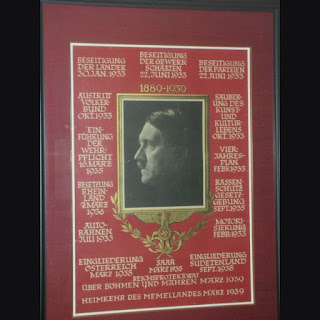Eighty years ago, a Scottish Duke bottles out of a slice of Hitler's birthday cake, but an English Baron tucks in
A
host of guests arrived in Berlin to take part in Hitler’s fiftieth birthday
celebrations. He had much to celebrate as well as his half-century. The guests included two notable British aristocrats. Lord Brocket headed
the Anglo-German Fellowship, and was on very good terms with Neville
Chamberlain. He was also a constituent, non-voting of course, of Rab Butler, the
extremely appeasement-mind junior Foreign Office Minister. Brocket himself was
an enthusiastic appeaser. The Duke of Buccleuch had recently been appointed as
the High Steward of Britain by King George VI. This was rather more than an
empty Court Office. The holder served as the link between the sovereign and the
House of Lords and was usually a former senior politician. Buccleuch vigorously
supported a negotiated settlement between Britain and Germany and was to
continue doing so well in the Second World War. Buccleuch’s attendance might
not have been to the taste of Buckingham Palace and he rapidly returned to
Britain, but Brocket stayed until the end.
Count
Ciano, the Italian foreign minister, issued a threadbare explanation for the
invasion of Albania and deposition of King Zog. The Albanians had been poor
allies and had constantly tried to take advantage of Italy. A new Quisling
prime minister of Albania offered the throne of the country to King Vittorio Emanuele, which the Italian parliament voted
through. This was a nice addition to his standing as King Emperor, which the
British recognition of his position as Emperor of Abyssinia a few months
previously had assured him. With the crowns of Sardinia, Cyprus, Jerusalem and
Armenia already on his head, this put him firmly ahead of George VI with his
meagre three kingdoms. Even if one aimed off for a distinct lack of military
presence and local acceptance in Vittorio Emanuele’s other overseas kingdoms,
he was level-pegging.
Having
guaranteed Poland at the end of March, the British had the bit between their
teeth in terms of extending protection to the smaller states of Europe.
Inspired, of course, by Mussolini’s excursion across the Adriatic, they issued
similar guarantees to Greece and Rumania. Winston Churchill’s private
suggestion that the former guarantee might usefully be given some teeth in the
form of an immediate British occupation of Corfu, was quietly ignored.



Comments
Post a Comment